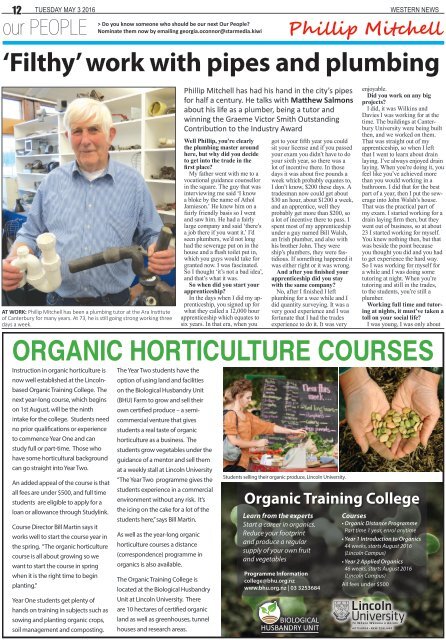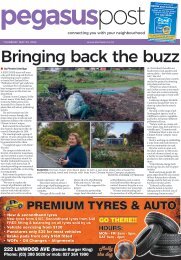Western News: May 03, 2016
You also want an ePaper? Increase the reach of your titles
YUMPU automatically turns print PDFs into web optimized ePapers that Google loves.
12<br />
Tuesday <strong>May</strong> 3 <strong>2016</strong><br />
our PEOPLE<br />
> Do you know someone who should be our next Our People?<br />
Nominate them now by emailing georgia.oconnor@starmedia.kiwi<br />
WESTERN NEWS<br />
Phillip Mitchell<br />
‘Filthy’ work with pipes and plumbing<br />
AT WORK: Phillip Mitchell has been a plumbing tutor at the Ara Institute<br />
of Canterbury for many years. At 73, he is still going strong working three<br />
days a week. <br />
Phillip Mitchell has had his hand in the city’s pipes<br />
for half a century. He talks with Matthew Salmons<br />
about his life as a plumber, being a tutor and<br />
winning the Graeme Victor Smith Outstanding<br />
Contribution to the Industry Award<br />
Well Phillip, you’re clearly<br />
the plumbing master around<br />
here, but why did you decide<br />
to get into the trade in the<br />
first place?<br />
My father went with me to a<br />
vocational guidance counsellor<br />
in the square. The guy that was<br />
interviewing me said ‘I know<br />
a bloke by the name of Athol<br />
Jamieson.’ He knew him on a<br />
fairly friendly basis so I went<br />
and saw him. He had a fairly<br />
large company and said ‘there’s<br />
a job there if you want it.’ I’d<br />
seen plumbers, we’d not long<br />
had the sewerage put on in the<br />
house and a flush toilet put in,<br />
which you guys would take for<br />
granted now. I was fascinated.<br />
So I thought ‘it’s not a bad idea’,<br />
and that’s what it was.<br />
So when did you start your<br />
apprenticeship?<br />
In the days when I did my apprenticeship,<br />
you signed up for<br />
what they called a 12,000 hour<br />
apprenticeship which equates to<br />
six years. In that era, when you<br />
got to your fifth year you could<br />
sit your license and if you passed<br />
your exam you didn’t have to do<br />
your sixth year, so there was a<br />
lot of incentive there. In those<br />
days it was about five pounds a<br />
week which probably equates to,<br />
I don’t know, $200 these days. A<br />
tradesman now could get about<br />
$30 an hour, about $1200 a week,<br />
and an apprentice, well they<br />
probably get more than $200, so<br />
a lot of incentive there to pass. I<br />
spent most of my apprenticeship<br />
under a guy named Bill Walsh,<br />
an Irish plumber, and also with<br />
his brother John. They were<br />
ship’s plumbers, they were fastidious.<br />
If something happened it<br />
was either right or it was wrong.<br />
And after you finished your<br />
apprenticeship did you stay<br />
with the same company?<br />
No, after I finished I left<br />
plumbing for a wee while and I<br />
did quantity surveying. It was a<br />
very good experience and I was<br />
fortunate that I had the trades<br />
experience to do it. It was very<br />
enjoyable.<br />
Did you work on any big<br />
projects?<br />
I did, it was Wilkins and<br />
Davies I was working for at the<br />
time. The buildings at Canterbury<br />
University were being built<br />
then, and we worked on them.<br />
That was straight out of my<br />
apprenticeship, so when I left<br />
that I went to learn about drain<br />
laying. I’ve always enjoyed drain<br />
laying. When you’re doing it, you<br />
feel like you’ve achieved more<br />
than you would working in a<br />
bathroom. I did that for the best<br />
part of a year, then I put the sewerage<br />
into John Walsh’s house.<br />
That was the practical part of<br />
my exam. I started working for a<br />
drain laying firm then, but they<br />
went out of business, so at about<br />
23 I started working for myself.<br />
You knew nothing then, but that<br />
was beside the point because<br />
you thought you did and you had<br />
to get experience the hard way.<br />
So I was working for myself for<br />
a while and I was doing some<br />
tutoring at night. When you’re<br />
tutoring and still in the trades,<br />
to the students, you’re still a<br />
plumber.<br />
Working full time and tutoring<br />
at nights, it must’ve taken a<br />
toll on your social life?<br />
I was young, I was only about<br />
ORGANIC HORTICULTURE COURSES<br />
Instruction in organic horticulture is<br />
now well established at the Lincolnbased<br />
Organic Training College. The<br />
next year-long course, which begins<br />
on 1st August, will be the ninth<br />
intake for the college. Students need<br />
no prior qualifications or experience<br />
to commence Year One and can<br />
study full or part-time. Those who<br />
have some horticultural background<br />
can go straight into Year Two.<br />
An added appeal of the course is that<br />
all fees are under $500, and full time<br />
students are eligible to apply for a<br />
loan or allowance through Studylink.<br />
Course Director Bill Martin says it<br />
works well to start the course year in<br />
the spring. “The organic horticulture<br />
course is all about growing so we<br />
want to start the course in spring<br />
when it is the right time to begin<br />
planting.”<br />
Year One students get plenty of<br />
hands on training in subjects such as<br />
sowing and planting organic crops,<br />
soil management and composting.<br />
The Year Two students have the<br />
option of using land and facilities<br />
on the Biological Husbandry Unit<br />
(BHU) Farm to grow and sell their<br />
own certified produce – a semicommercial<br />
venture that gives<br />
students a real taste of organic<br />
horticulture as a business. The<br />
students grow vegetables under the<br />
guidance of a mentor and sell them<br />
at a weekly stall at Lincoln University<br />
“The Year Two programme gives the<br />
students experience in a commercial<br />
environment without any risk. It’s<br />
the icing on the cake for a lot of the<br />
students here,” says Bill Martin.<br />
As well as the year-long organic<br />
horticulture courses a distance<br />
(correspondence) programme in<br />
organics is also available.<br />
The Organic Training College is<br />
located at the Biological Husbandry<br />
Unit at Lincoln University. There<br />
are 10 hectares of certified organic<br />
land as well as greenhouses, tunnel<br />
houses and research areas.<br />
Students selling their organic produce, Lincoln University.<br />
Organic Training College<br />
Learn from the experts<br />
Start a career in organics.<br />
Reduce your footprint<br />
and produce a regular<br />
supply of your own fruit<br />
and vegetables<br />
Programme Information<br />
college@bhu.org.nz<br />
www.bhu.org.nz | <strong>03</strong> 3253684<br />
Courses<br />
• Organic Distance Programme<br />
Part time 1 year, enrol anytime<br />
• Year 1 Introduction to Organics<br />
44 weeks, starts August <strong>2016</strong><br />
(Lincoln Campus)<br />
• Year 2 Applied Organics<br />
46 weeks, starts August <strong>2016</strong><br />
(Lincoln Campus)<br />
All fees under $500


















